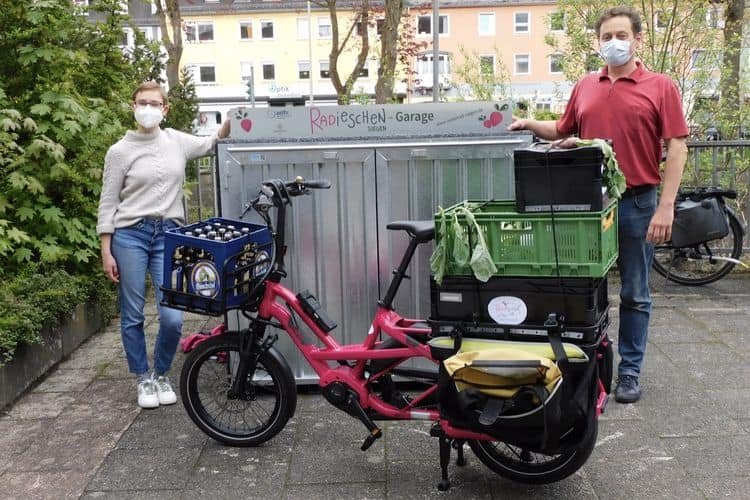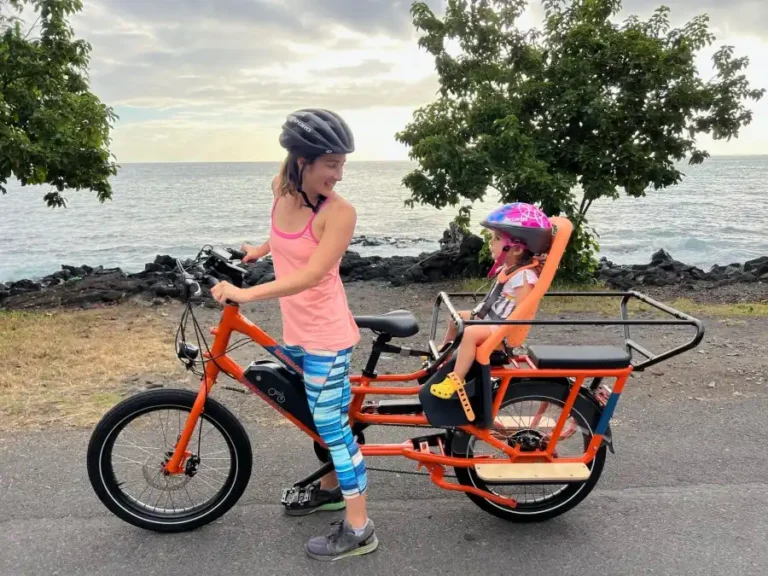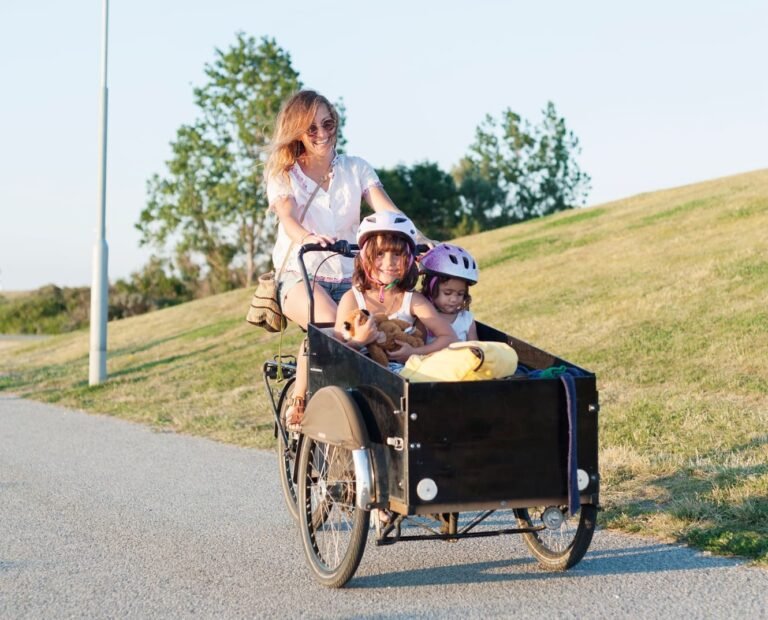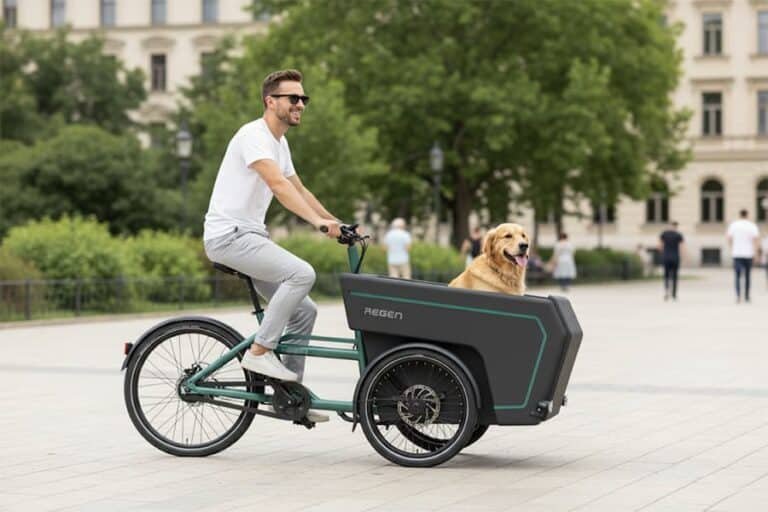This is a practical, numbers-driven guide to budgeting certification for kaubarattad (including e-cargo bikes). It explains what you actually need to test, where the money goes, credible cost ranges, timelinesja how to control spend without risking compliance failures.
Hello, I am the Editor Freya ,working in Regen Technology Co., Ltd. We are the Cargo Bike Mannufacturer providing OEM and ODM service. I will share some knowledge and research results, and explain from the manufacturer’s perspective why everyone thinks cargo bikes are expensive. What exactly makes them so expensive?
I’ll cover Europe (EN 17860 & EN 15194 under the CE framework) and North America (UL 2849, UL 2271, UN 38.3, plus local rules like NYC and California). Where public sources publish scope or process (but not price), I cite them; for prices, I give realistic estimate ranges derived from industry norms, published ranges for adjacent tests (e.g., battery UL/UN costs), and recent market practice. Exact quotes vary by lab, product family, and how many variants you submit.
1) What standards actually apply to a cargo bike?
Europe (CE marking)
For a kaubaratas intended for public roads in the EU (with or without electric assist), you’ll touch two big families of standards:
- EN 17860 — “Carrier Cycles” (cargo bikes & trailers) This is the new, multi-part European series created specifically for cargo bikes. It covers the mechanical aspects for single-track and multi-track cargo bikes (light and heavy), trailers, passenger transport modules, and—importantly—an electrical aspects part tailored to carrier cycles. The parts include (simplified):
- Part 1: Terms/structure/overview
- Part 2: Lightweight single-track carrier cycles – mechanical
- Part 3: Lightweight multi-track carrier cycles – mechanical (approved July 2024)
- Part 4: Heavy multi-track – mechanical (in the series)
- Part 5: Electrical aspects for carrier cycles (covers electrical safety across bikes/trailers/batteries/chargers; integrates with other e-bike/battery standards)
- Part 6: Passenger transport
- Part 7: Trailers (safety requirements)
CEN/TC 333/WG9 leads the series. Labs and standards catalogs confirm scope and parts; for example, ACT Lab’s technical note and SGS overviews describe EN 17860 as covering single- and multi-track cargo bikes (including heavy), trailers, and electrical aspects, with Part 3 already approved.
- EN 15194 — EPAC (e-bike) safety & EMC If the cargo bike is an EPAC (max 25 km/h assist, 250 W continuous), you also need EN 15194 (current edition 2017 with 2023 amendment). EN 15194 is the long-standing EU e-bike standard covering safety and EMC for the complete EPAC. It references EN 50604-1 for battery safety. Recent notes from BSI/DIN confirm the 2017+A1:2023 status; industry briefings explain the battery linkage to EN 50604-1.
Related/component standards you may touch under CE:
- EN 50604-1 (+A1/A2) — safety of traction battery packs for light EVs, including e-bikes; explicitly referenced by EN 15194 and included in EN 17860-5’s electrical aspects remit.
- ISO 11243:2023 — luggage carriers (relevant if your rear/front rack is a separable item).
- EN 15918 — cycle trailers (if you supply a trailer or a passenger-carrying trailer module).
United States/Canada
The US has no federal “cargo bike” mechanical standard equivalent to EN 17860. Instead, the safety focus is electrical/fire:
- UL 2849 - system-level electrical/fire safety for e-bikes (battery, charger, motor, controller, harness) as an integrated system; tested by an NRTL. UL describes scope and test focus. Some programs (NYC rebates/retail rules, Denver rebates) now nõuda UL 2849 compliance.
- UL 2271 - battery pack safety for light EVs; often paired with UL 2849.
- UN 38.3 — transport safety for lithium batteries (air/sea/road), universally needed for shipping packs.
Local/regional rules increasingly point to UL 2849/2271: New Yorgi linn made third-party certification mandatory in 2023; California SB-1271 requires certified e-bike batteries statewide from January 1, 2026 (State Fire Marshal rules).
Practical takeaway for North America: to sell comfortably—and to access programs in NYC/Denver/major retailers—plan on UL 2849 (system) + UL 2271 (battery) + UN 38.3 (shipping). EMC/FCC only applies if you integrate radios (BLE/LTE) beyond certified modules.
2) How labs price projects (and what drives the number up)
Certification quotes are bespoke, but the main levers are consistent:
- Scope & parts tested: Single-track vs multi-track, heavy-duty payload categories, passenger modules, trailer attachments (EN 17860-6/-7), and whether you include electrical aspects in the EN 17860 program vs rely on EN 15194 only.
- System complexity: Number of drive system variants (e.g., Bosch/Shimano/Bafang), alternate motors/ECUs/chargers, dual batteries, CAN harnesses, etc. Each combination expands testing. UL 2849 is system-level, so swapping one component can trigger re-evaluation.
- Battery strategy: Using a pre-certified pack (UL 2271) vs your own new pack (full UL 2271 + UN 38.3). Published battery-cert cost/time ranges exist for common certifications (UN 38.3, UL/IEC) and help triangulate budgets.
- Samples needed: Mechanical tests need complete bikes; electrical tests need full systems plus mitu batteries and chargers; UN 38.3 consumes dozens of cells/packs across abuse tests (industry sources cite ~16 packs; some labs specify 8 packs per certain tests). More samples = higher build/logistics cost.
- Documentation readiness: DFMEA, risk assessment, user manual, tech file. Clean documentation reduces lab engineering hours and avoids retests.
- Retest loops & change control: Late design changes and failed tests are the biggest budget killers.
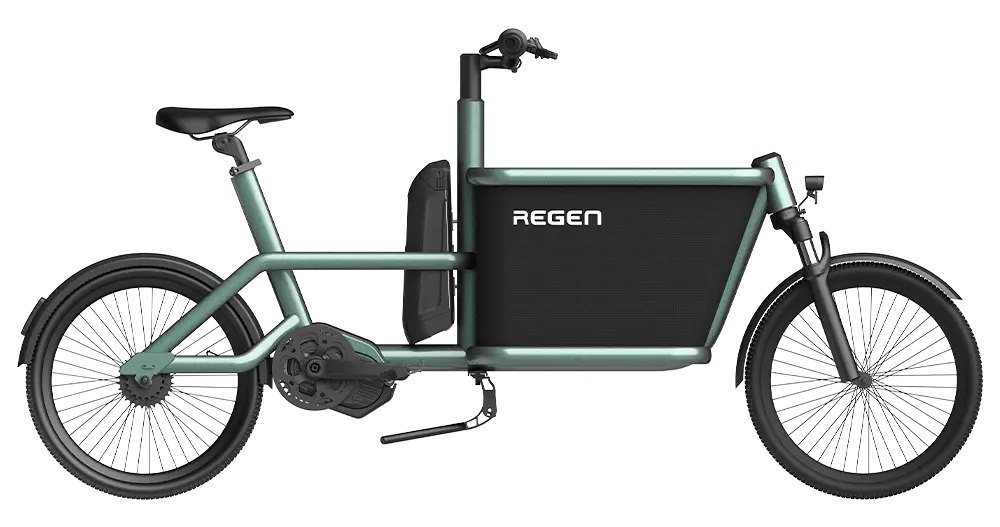
Regen 02 elektriline kaubaratas
Kas otsite oma kaubamärgile kompaktset ja kohandatavat esilaadurit?
TÜV-testitud varasemate eritellimusprojektide kaudu. Avalikult saadaval olev mudel – konfigureeritav, tõestatud ja skaleerimisvalmis.
3) Realistic cost ranges (USD) and timelines
Exact prices depend on your lab (UL Solutions, TÜV, SGS, Intertek, ACT Lab, etc.), the number of variants, and whether you can reuse existing certifications. Public sources typically confirm scope/timelines rather than fees; however, there are published cost/time ranges for aku certifications that anchor a realistic budget. Where exact numbers aren’t published, I present conservative estimate bands.
A) Europe (CE) — EN 17860 + EN 15194 + battery & EMC
| EU test item | What it covers | Est. lab fee (USD) | Typical timeline |
|---|---|---|---|
| EN 17860 mechanical (choose part(s) by configuration) | Bench/road durability, frames/forks/steering/brakes/attachments for cargo loads. Separate parts for single-track, multi-track, heavy. | $7k–$25k per model per part tested | 6–10 weeks (per part) |
| EN 17860-5 electrical aspects | Functional/electrical safety across carrier cycles; aligns with EPAC battery/charger aspects. | $8k–$20k | 6–10 weeks |
| EN 15194 (EPAC) | Complete e-bike safety & EMC for 25 km/h/250 W cargo e-bikes; references EN 50604-1 for battery. | $12k–$25k per system | 8–12 weeks. Labs confirm global test capability & scope; amendment A1:2023 is current. |
| EN 50604-1 battery (if your pack isn’t already certified) | Traction battery safety testing. | $10k–$25k | 6–10 weeks. EN 50604-1 use is referenced within EN 15194 and EN 17860 electrical aspects. |
| UN 38.3 (battery transport) | Mandatory shipping safety for Li-ion packs. | $5k–$7k (well-published range) | 4–6 weeks. Industry sources show typical timing and sample counts. |
Why these ranges are reasonable: Industry battery specialists publish UN 38.3 ≈ $5–7k, 4–6 weeksja UL/IEC battery programs in the low- to mid-five figures with ~10–12 weeks—numbers that align with lab reality and your NPI cadence.
B) United States/Canada — UL 2849 + UL 2271 + UN 38.3 (+ local rules)
| North America test item | What it covers | Est. lab fee (USD) | Typical timeline |
|---|---|---|---|
| UL 2849 (system) | Integrated e-bike electrical system (battery, BMS, charger, motor/controller, wiring) for shock/fire hazards. | $30k–$100k per system (scope-dependent) | 10–14 weeks (system complexity drives this). UL scope/treatment documented publicly; local programs increasingly mandate it (NYC/Denver). |
| UL 2271 (battery pack) | Pack-level safety for LEV batteries. | $20k–$60k | 8–12 weeks. Battery certification costs for UL-type programs commonly land in the five-figure range. |
| UN 38.3 (battery transport) | Transport safety for Li-ion packs. | $5k–$7k | 4–6 weeks. |
| FCC/IC (if radio added) | RF/EMC for BLE/LTE modules if not pre-certified. | $2k–$8k | 2–6 weeks |
Policy note: NYC made third-party certification mandatory in September 2023; California SB-1271 requires certified batteries statewide starting January 1, 2026. Planning for UL 2849/2271 is now a de-risking must for US programs.
C) What about DIN 79010?
Before EN 17860, DIN 79010:2020 (Germany) was the go-to cargo bike mechanical standard; several brands still cite it. EN 17860 now generalizes cargo bike requirements Europe-wide (and includes electrical aspects). If you already tested to DIN 79010, discuss gap-assessment vs EN 17860 with your lab.
4) Sample Budget Senarios You Can Take To management
All figures below are external lab fees only. They exclude your sample build, shipping, engineering time, translations, and change iterations.
Scenario A — EU-only, single-track e-cargo bike (one motor/one battery)
- EN 17860-2 mechanical (single-track): $8k–$15k
- EN 17860-5 electrical aspects: $8k–$15k
- EN 15194 (EPAC safety + EMC): $12k–$20k
- Battery EN 50604-1 (if pack not pre-certified): $10k–$20k
- UN 38.3 (battery transport): $5k–$7k
Total: $43k–$77k (with a new battery); $33k–$57k (if you reuse a proven, documented EN 50604-1 battery). Timelines overlap; expect 10–14 weeks elapsed if you parallelize.
Scenario B — US (NYC-compliant) e-cargo bike
- UL 2849 system: $30k–$80k (one system)
- UL 2271 battery (if needed): $20k–$50k
- UN 38.3: $5k–$7k
- FCC (if needed): $2k–$5k
Total: $57k–$142k depending on whether the battery is already certified and whether you add radios. Plan 12–16 weeks elapsed for a clean run.
Scenario C — Global launch, two variants (single-track + multi-track), one electrical system
- EN 17860-2 + EN 17860-3 mechanical (two parts): $20k–$40k
- EN 17860-5 electrical aspects: $10k–$20k
- EN 15194: $12k–$20k
- UL 2849: $35k–$90k
- UL 2271 (if new pack): $20k–$50k
- UN 38.3: $5k–$7k
Total: $102k–$227k (new battery); subtract $20k–$50k if reusing a listed 2271 pack with paperwork.
5) Timelines, samples, and planning realities
- Time: Published tables for battery certifications show UL-type programs ≈ 10–12 weeks, UN 38.3 ≈ 4–6 weeks. Whole-bike programs (EN 15194, EN 17860 parts) typically slot into 6–12 weeks each, and you should plan parallel workstreams to keep elapsed time within a quarter.
- Samples: UN 38.3 will consume multiple packs (industry examples cite ~16 packs total, with certain tests specifying eight packs per test), so budget battery sample cost accordingly. Whole-bike mechanical programs usually require 2–4 complete bikes plus spares (forks, bars, wheels, steering linkages).
- Documentation: For CE, prepare a technical file (risk assessment, drawings, test reports, manuals). For UL, assemble BOMs, safety-critical component lists, wiring schematics, software/firmware descriptionsja charger compatibility evidence—UL guidance and CPSC correspondence emphasize charger-battery compatibility controls.
6) Where to spend vs where to save
Spend here (do not skimp):
- Battery safety & system integration: Whether you go EN 50604-1 (EU) or UL 2271/2849 (US), treat the battery + charger + harness as a single safety system. UL 2849 is recognized as the system-level “gold standard” for e-bike electrical/fire safety.
- Mechanical fatigue & brakes for loaded bikes: Cargo frames, linkages, and 4-piston brakes take abuse; failures here create liability beyond any lab fee savings. EN 17860 provides the correct load cases for cargo use.
Ways to control cost without compromising safety:
- Minimize variants in your first submission. Each motor/charger/battery variant can trigger additional runs (especially under UL 2849). Use family certification rules where allowed.
- Prefer a pre-certified battery pack (UL 2271, documented EN 50604-1) from a supplier with UN 38.3 reports and test summaries ready. This can remove a whole five-figure line item and weeks of schedule.
- Pre-compliance testing: Run internal fatigue/impact/EMC screens before booking the lab. Early detection saves a retest loop.
- One-system strategy for the US: If you must support multiple frames, keep the electrical system identical to avoid multiple UL 2849 programs.
- Documentation discipline: A watertight FMEA, risk analysis, and wiring/firmware dossier cuts lab engineering time.
- Bundle tests at one lab (where expertise exists) to avoid shipping delays and duplicated administration.
7) Common pitfalls that inflate budgets
- Assuming EN 15194 is “enough” for cargo: It isn’t. EN 15194 is the EPAC baseline; EN 17860 addresses cargo-specific loads, multi-track geometry, and (via Part 5) electrical aspects relevant to carrier cycles. Plan both.
- Under-budgeting batteries: Even when you reuse a supplier’s pack, confirm current certificates (UL 2271 listing, EN 50604-1 report), cell equivalenceja charger lock-in logic. CPSC/UL correspondence stresses charger compatibility—an easy place to fail if you allow third-party chargers.
- Variant creep during testing: Push change requests after the report is signed, not mid-campaign.
- Ignoring policy shifts: NYC already mandates UL; California follows with statewide certified batteries in 2026. Design your US system to UL 2849/2271 from day one to avoid stranded inventory.
8) Rough line-item budget ranges you can plug into a spreadsheet
Treat these as planning placeholders until you receive formal quotes.
EU (CE) — one e-cargo model, one system
- EN 17860 mechanical (one relevant part): $8k–$15k
- EN 17860-5 electrical aspects: $8k–$15k
- EN 15194 (EPAC safety + EMC): $12k–$20k
- EN 50604-1 battery (if needed): $10k–$20k
- UN 38.3: $5k–$7k
- Project management/translation/technical file (external, optional): $3k–$8k
Subtotal: $46k–$85k (või $36k–$65k with a pre-certified battery).
US/Canada — one e-cargo model, one system
- UL 2849 (system): $30k–$80k
- UL 2271 (battery) if needed: $20k–$50k
- UN 38.3: $5k–$7k
- FCC (if radio): $2k–$5k
- NRTL listing/annual maintenance (first year): $2k–$10k (varies with lab & surveillance scope)
Subtotal: $59k–$152k (battery pre-cert knocks $20k–$50k off).
Sanity check against published anchors: UN 38.3 $5k–$7k, 4–6 weeks; UL/IEC battery programs 10–12 weeks ja five-figure costs; UL 2849 is system-level and typically quotes in the five-figure band, with local rules (NYC, Denver) driving demand.
9) Timeline planning (first article → certification)
- D-120 to D-90: Freeze electrical architecture (battery chemistry, BMS, motor, controller, charger). Lock cargo geometry and steering linkage BOM.
- D-90 to D-75: Book lab benches (mechanical & electrical). Provide DFMEA, risk assessment, wiring, manuals (draft OK).
- D-75 to D-0: Ship 2–4 complete bikes, multiple battery packs ja chargers, plus components.
- Week 1–4: Mechanical endurance & braking (EN 17860-2/-3/-4). Early failures here are the #1 rework risk.
- Week 4–8: Electrical safety & EMC (EN 15194 + EN 17860-5) and UL 2849 (if parallel US track).
- Week 6–10: UN 38.3 runs in parallel.
- Week 10–14: Report issue, corrective actions (if any), and certificate/listing issuance.
These durations align with the published battery certification timelines (10–12 weeks UL; 4–6 weeks UN 38.3) and typical whole-bike programs.
10) FAQ: Quick answers you can forward internally
Q: Do we need both EN 17860 and EN 15194 for e-cargo bikes?
Jah. EN 17860 addresses the lasti use case (mechanical, passenger, trailer, and an electrical aspects part); EN 15194 addresses EPAC safety & EMC for 25 km/h/250 W e-bikes. Together they cover your e-cargo bike.
Q: Is DIN 79010 still relevant?
It’s still referenced by brands and labs, but EN 17860 is the new European reference for cargo bikes. Use DIN 79010 only as a legacy benchmark or for gap checks.
Q: What’s the cheapest path to a US-compliant system?
Adopt a UL 2849-listed drive system + UL 2271-listed battery from a top-tier supplier; add UN 38.3 paperwork. This avoids a first-time battery program and collapses timeline and risk. UL documents the system approach; local programs (NYC/Denver) recognize UL 2849.
Q: How many battery packs do we need to budget for testing?
For UN 38.3 alone, plan double-digit pack quantities (industry examples often cite ~16 packs in total, and some tests specify eight packs). For UL/EN battery programs, your lab will specify additional packs.
Q: Are these costs one-time?
Mostly. But labs may charge annual listing/surveillance fees (UL), and design changes can trigger partial retests.
11) Actionable next steps (cost-efficient path)
- Define the exact configurations you plan to sell in the next 12–18 months (single-track, multi-track, passenger kit, trailer option). Map them to EN 17860 parts now.
- Pick a single electrical system for global use (EU + US) to avoid duplicated programs.
- Source a pre-certified battery (UL 2271; EN 50604-1 report) and charger pair from one supplier who will share full test reports and allow CBOM traceability.
- Request bundled quotes from two labs (e.g., UL Solutions, Intertek, SGS, TÜV, ACT Lab) for:
- EN 17860 mechanical (relevant parts)
- EN 17860-5 electrical aspects + EN 15194
- UL 2849 (+ UL 2271 if you self-design the pack)
- UN 38.3 Ask for family certification options and sample counts up front.
- Run pre-compliance fatigue on frames/kickstands/steering and a thermal/charge-fault screen on the battery/charger to reduce retest risk.
- Lock change control during test window; any BOM swaps wait until after certification.
Sources (scope, status, and policy; labs rarely publish prices)
- EN 17860 series overview & parts/scope (cargo bikes, trailers, electrical aspects): ACT Lab technical update; SGS explainer (CEN/TC 333/WG 9; single-/multi-track, heavy cargo, trailers, electrical aspects).
- EN 17860-3 approval (multi-track mechanical aspects): iTeh standards listing.
- EN 15194 status (2017 + A1:2023) and role in EPAC compliance; BSI/DIN listings.
- EN 15194 battery reference to EN 50604-1; EN 50604-1 overview and amendments.
- UL 2849 scope & treatment as system-level certification (and local mandates in NYC/Denver).
- UN 38.3 cost/time anchors & sample expectations (industry battery sources & labs).
Final budgeting takeaway
- For one EU e-cargo bike, plan $35k–$80k depending on whether your battery is already proven and how many EN 17860 parts you trigger.
- For one US (NYC-ready) e-cargo bike, plan $60k–$150k depending on whether you reuse a UL-listed system/battery.
- A global program with two mechanical variants can easily land in $100k–$200k in external lab fees—before change iterations.
If you share your exact configuration map (single/multi-track, GVW, passenger modules, trailer option, drive system choices), I can turn these ranges into a line-item quote request template you can send to your preferred labs, plus a sample/build plan to minimize retests.
Viiteluetelu
- ACT Lab. (2024). EN 17860 series overview for cargo cycles. Retrieved from https://www.act-lab.com/
- BSI Group. (2023). BS EN 15194:2017+A1:2023 — Cycles. Electrically power assisted cycles. EPAC bicycles. Retrieved from https://shop.bsigroup.com/
- California State Legislature. (2024). SB-1271 Electric bicycles: battery safety. Retrieved from https://leginfo.legislature.ca.gov/
- CEN/TC 333/WG 9. (2024). EN 17860 — Carrier cycles series (Parts 1–7)Euroopa Standardikomitee.
- DIN. (2020). DIN 79010:2020 — Cycles – Carrier cycles. Deutsches Institut für Normung.
- iTeh Standards Store. (2024). EN 17860-3:2024 — Carrier cycles – Mechanical safety requirements for lightweight multi-track cycles. Retrieved from https://standards.iteh.ai/
- New York City Fire Department. (2023). Lithium-ion battery safety: E-bike and E-scooter certification requirements. Retrieved from https://www.nyc.gov/
- SGS Group. (2024). Understanding EN 17860 for cargo bikes. Retrieved from https://www.sgs.com/
- UL Standards & Engagement. (2023). UL 2849 — Standard for electrical systems for e-bikes. Retrieved from https://ulstandards.ul.com/
- UL Standards & Engagement. (2023). UL 2271 — Standard for batteries for use in light electric vehicles. Retrieved from https://ulstandards.ul.com/
- United Nations. (2015). UN Manual of Tests and Criteria, Section 38.3 — Recommendations on the transport of dangerous goods. United Nations Economic Commission for Europe.
- U.S. Consumer Product Safety Commission. (2023). E-bike battery and charger safety guidance. Retrieved from https://www.cpsc.gov/



